Jun
12
Oral History in West Yellowstone, Montana
June 12, 2017 | Comments Off on Oral History in West Yellowstone, Montana
Bison One’s Interview with James Rowan
West Yellowstone, Montana
May 28, 2017, 12:00 p.m.
“Uhs,” “ums,” and “Mm-hms” have been removed from this transcript. However, crutch words and false starts are included.
James Rowan: My name’s Jimmy.
Dana Thomas: Jimmy? Okay.
JR: Yea, my name.
DT: We’ll just have you state your full name, and then how to spell it so we can put it in there.
JR: James Rowan, R-O-W-A-N
Allison Marrin: I’m Allison, if I may introduce myself, and that’s Dana and Derek.
JR: Dana and Derek?
DT: Yes sir.
JR: D, D, Allison, okay.
DT: Good way to remember. So we, the day is the 28th of May, and, what’s the time, Derek?
Derek Holmberg: The time is 12:00pm on the dot.
AM: Now we have to say the-
DT: Oh, and the location of the interview is Our Lady of-
JR: the Pines.
DT: the Pines, Yes. Catholic church.
JR: in West Yellowstone, Montana.
DT: Yes, okay.
JR: Do you hear my accent? That’s my Philly accent; *All laugh* I never got rid of it.
DT: So this interview is being recorded for use by Longwood University, any information given may be made public. Okay? So, how long have you lived here?
JR: Fifteen years.
AM: What brought you out here?
JR: Well, I, have you guys ever heard of the South Dakota Motorcycle Rally?
DT, AM: No.
JR: You should look that up. *All laugh* It’s, it’s the biggest motorcycle rally in the world. The get, you know, about on average, half-a-million people come from all over the world.
AM: Jeez.
JR: It’s like a nine, ten-day thing, like two, two weekends, with a week in between so it’s like nine, ten days. And, I rode my motorcycle up from, up down in Florida at the time. My mother had a winter, we were snowbirds; we would go down on the weekends a lot, during holidays, and to Palm Beach Florida. Like down the street from where President Trump. So I rode my motorcycle from south Florida to South Dakota, which is south-west South Dakota.
DT: Wow.
JR: And since I was there a week, I did day trips into Montana and Wyoming. Because of, you know the map, it’s, South Dakota borders, you got, like, Montana here and South Dakot- and Wyoming. So I did day trips into Montana and Wyoming, and fell in love and said “one day, I’m getting’ a place out here.” And, I did. *All laugh* Yea, I came out a few, few summers, you know to scope out places. You know, looked at stuff on the internet, made lists of places that looked good. But you got to see them in person. Got to like the vibes.
DT, AM: Yeah.
JR: And we found a place I liked. Bought it, and then I lived for, let me see, for four or five years I kept, kept my home in south Florida. But then I sold that, and just, I’ve been, ten years just based out of Montana. But I travel a lot, so that helps because, you know, I’m a city guy. I mean, I was born and raised in Philly.
AM: Yeah.
JR: And then I worked. My family is in the clothing business; I lived and worked in Manhattan ten years. So this was kind of the opposite of New York City.
AM: Quite.
DT: Yea, a little bit. So, do you like it here?
JR: Yea. No, I love it, I, you know, well, you can’t beat the scenery. How do you like the scenery around here?
DT, AM: It’s beautiful.
AM: Yeah.
DT: Absolutely.
JR: Is this your first time out down here?
DH: Yes.
JR: Yea it’s like God’s country, man.
DH: It really is.
JR: And I like, thankfully we just, I think last year we dropped below one million for the whole state, so that’s, I like that.
DH: Oh really? So the state’s population has been shrinking?
JR: Well, it was like it went over a million, you know, like a million one, million two, but now it’s back down to just under a million.
JR: I like the state with one area code-
JR: for landlines and cellphones, only one area code, 406.
AM: Really?
DT: Awesome.
DH: Interesting.
JR: And, It’s funny. I like, I liked to get my dose of the cities. Like, I go back, after working in the clothing business, I don’t know how much- Do you know anything about boxing, anybody?
AM: No.
JR: Okay, well Philadelphia, my hometown, is probably known, not just nationwide but worldwide, as like known for its toughest fighters. Like if you’re watching a fight on TV and a guy’s real tough, the caller guy will say he fights like a Philly fighter. *DT laughs* That’s where Smokin’ Joe Frasier is from. I’m sure you’ve heard of him.
AM: I might have, I don’t know. I think I’ve seen a movie about boxing-
JR: He had three great, three great fights with Muhammad Ali.
AM: Oh, okay.
JR: First one he beat Ali, broke his jaw. Knocked him down, Madison Square Garden, 1971. He was a good friend of mine. And, God, you know, is it more about me, or like, you know, because, you tell me what you want me to focus on.
AM: No, whatever you want to talk about.
DT: It’s all about-
DT, AM: It’s your show.
JR: Okay. Well, thanks to my Mom, I’m here. She’s my mother’s my hero. May she rest in peace, she just died this past November.
AM: I’m sorry.
DT: Sorry for your loss.
JR: Thank you. She was born in Poland.
AM: Wow.
JR: 1928. Lived there 1939, if you know, do you know your history? Do, do you remember that, in ’39 to ’41, Hitler made a non-aggression pact with Stalin to, if you don’t interfere when I invade Poland, I’ll give you eastern Poland. So the Vistula river is the dividing point. My mother lived in eastern Poland. As a matter of fact, where she’s from is Lithuania now.
AM: Okay.
JR: You know how they changed the borders all these different bunch of times. So because their parents were teachers, and they’re Catholics, and the communists don’t like educated people. Siberia took her father somewhere else. His name, he’s Austrian, my mother’s father is Austrian. My maiden, my mother’s maiden name is, is a little trivia, is Jong, J-O-N-G. I’m related to Carl Jong, you know, the famous psychiatrist?
AM: Oh really?
DT: Really?
JR: Yea. And my mother, her sister, my grandmother, you know, Russian soldiers come to their house and, so they got a half hour to pack a bag and you’re out of here. So at home, all their belongings, everything. Put it on cattle cars, sent to Siberia. You know you only hear about that one tribe, but it was many people who suffered. And many people died in World War Two, most people have no idea. And I don’t mean it as a, like a put-down or, but- Like, did you ever, do you know how many people actually died in World War Two?
AM: I know it was like, eleven million just Jews, wasn’t it?
JR: No, it was, well, they, they used the number six million, but since the Soviet Union collapsed, once the historians had access to documents that the Russians confiscated, the number’s closer to four million. Which is horrible, you know, I’m against holocaust, I’m against terrorism. Though I support the Palestinians and their mistreatment. Well, most people, it’s a hard number to grasp, but, but say that the low number estimates are fifty-five to seventy million people died in World War Two. So many, they don’t know how many men. But we only hear about that tribe, which is kind of bugaboo where people like my mother, and non-Jews, gentiles, they were exiled to Sib- you don’t hear about them it’s like they don’t count. And she lived with Mongolians. Took her in for three years, in a mud hut. And one of their, Polish exiles, got back to Warsaw and got a hold of my mother’s uncle, told them where they were. I guess it was just a village name, no street address-
AM: Yeah.
JR: and he’s sewed gold Russian coins in the lapels of their winter, winter coats. Sent them to them, and they got there. Because, they, you know were stuck there, no money, you know no, no means of transportation you know but what are you going to do? So, I remember when they, the coats got there, my grandmother, she was feeling around and opened up the seams and found the coins and says “oh my God, we don’t have to stay here and die!” So they walk like a hundred and fifty miles south to Kaska caught a train to the Caspian Sea. Crossed the Caspian Sea to Persia which is Iran. Lived there a year. Then went to an American Army camp in Lebanon for a year. And the coins is what they used to barter their way through. And this is one of those coins, if you want to check it out; I made a ring out of it, this is one of the smaller ones.
DT: Oh wow.
James: That’s, that’s Czar Nicholas, the last czar of Russia.
DT: Wow.
JR: Circa 1899.
DT: That’s a good thing to do with it. Make it into a ring.
JR: I decided to make it because it’s, hey, I’m, I’d be Mongolian if it wasn’t for the, those coins.
DT, AM: Yea, yea.
JR: Because, how could I get out, I mean-
AM: Yeah, wow.
DT: That’s crazy.
DH: That’s a Russian coin?
JR: Yea! That’s Czar Nicholas II on there, he was, you know, the last czar.
DH: So, was that coin made like, before the, what’s it called, the Bolshevik Revolution?
JR: Yea, this coin’s 1899.
DH: Oh yea.
DT: Wow.
AM: That’s pretty cool.
JR: On, on the back, you can see the date. Yea. yea, he was the one that they deposed and then murdered him and his wife and children. If you remember. And my mother came in this country, settled in Philadelphia. She came at 17; spoke no English. No money. And she was a designer, and she loved clothes. She didn’t have the education for it, but, she worked hard and worked her way up and met a man and they started a label together, and she was successful in the clothing business. Did you ever hear the label “Jones New York”?
AM: Wait, what?
JR: It’s called “Jones New York.”
DT: I don’t think I’ve heard of it.
JR: It’s better sportswear, you know, we sell, we sell better department stores like, you know, like I think Bloomingdales, you know Macy’s, Nordstrom those kinds of stores. And, because she succeeded in Philadelphia… Anyway, back to the boxing. So, for the past 20 something years, I, I’ve managed professional boxers.
DT: Oh, wow.
AM: So you’ve done like, everything. So you’ve done everything.
JR: A little bit of everything.
AM: A little bit of everything.
JR: And then I, my mother founded three charities; she wanted to give back to Philadelphia, so her focus is single women with children. So we have, and you can look it up sometime if you want, there’s Rowan House, that’s traditional housing, I mean, transitional housing for women that come off the streets, mostly teenage moms. You know they can study for their GED, computer, and teach infant massage, teach them how, get through all the red tape to get the benefits they’re entitled to. And then we help them find a job and an apartment for rent, but they stay responsible for paying their rent and their job for two years we help them buy a place.
DT: That’s nice.
JR: So there’s Rowan Homes. And, which is administered by, she, she’s a great lady, Sister Mary Scullion. She has a organization project home, and she, she works with all the homeless. She and my mother, like, hit it off, so, you know instead of reinventing the wheel and hiring all new staff, you know you need people to you know, maintenance people, and people that, you know pay the bills, and accounting and all that stuff. So instead of hiring new people, Sister Mary, she’s a mercy nun. She’s pretty famous; a few years ago, she was one of Time’s 100 most influential women.
AM and DT: Wow.
DH: Oh really?
JR: Yea, if you want a name, it’s Sister Mary Scullion, S-C-U-L-L-I-O-N.
DH: I-O-N?
JR: L-L-I-O-N.
DH: Okay.
JH: Yea I just saw two weeks ago she gave a commencement speech at Georgetown.
AM: Oh wow.
DT: Awesome.
JR: And it’s like a, it’s a combination of city, lo- city, state, federal, private funds. And like our model is, is very good, like, you know, we have one of the highest ratings. There, there’s this, like have you ever heard D & B down on Bradstreet, it’s, they rate businesses.
AM: Okay.
JR: You know, their credit worthiness-
AM: Yea.
JR: Well, there’s a site called “Charity Navigator.” Like If you want to donate to a site and, and see like how much if, if a person- If you want to be listed with “Charity Navigator” you have to turn over all your books to them. So they go through your accounting records and know how, where the money goes. Okay, ours is 88, 90 percent goes directly to the charity. You take things like, like Susan Komen Foundation, you know, breast cancer, you know- about 85 percent of their money just goes to raising more money for next year; very small percentage goes to actual cancer research or cures. It’s a joke. But nobody look, you know, most people don’t look at that, you know, because they, they do so much advertising-
AM: Right.
JR: and promotion, people just assume it’s a great thing. Or like, you know, “Hillbilly” Clinton and his Haiti thing, all, all the money they raised, last time I looked only 10 percent of the money they raised for Haiti’s earthquake went to Haiti.
DT and AM: Wow.
JR: The rest went in their pockets and whoever else’s- So, we have a good rein- and then she has, my mother has a breast, she’s a two-time breast cancer survivor.
DT and AM: Wow.
JR: And started a breast cancer center, University of Pennsylvania Hospital.
AM: That’s awesome.
JR: Which is my alma mater. I went to Catholic Grade School high school but, then I went to Penn.
DT: Really?
JR: Yea.
DT: Been up there.
JR: You got to go to Philly, man, that’s the most historic-
AM: On the bucket list.
JR: Huh?
AM: On the bucket list; it’s after this one.
JR: It’s the most historic city in the country.
AM: Yeah.
JR: You know that, right? I mean, the Declaration of Independence, signed there, written, signed there. Constitution written, signed there. First capital of the United States. It’s where the navy started. John Barry founded the US Navy. I can go on and on, Ben Franklin. *All laugh* Philadelphia we have the, Philadelphia has the first zoo in the United States.
AM: Does it?
DT: Really.
JR: Yup. Ben Franklin, it was his idea for volunteer fire department. Philadelphia the first free library in the country, it was in Philadelphia. And, Philadelphia’s got a lot of firsts.
DT and AM: Yeah.
DT: That’s awesome.
AM: Sounds like it.
DT: So, going off of that, being that they both, Yellowstone and Philly, probably has a lot of tourism. How would you compare-
JR: Ah, yeah.
DT: the two. How have you seen tourism in Yellowstone compared to Philly?
JR: Oh, well here you obviously people come here, they come to see, you know, the, the nature like, you know, as you know, why I like, why I like this area, like, I drive a lot across country. Because I, I have one of those entertainer busses, you know. That’s like an RV that I live on.
DT: Oh, okay.
JR: Me and my dog. I’m single. No kids, never married. And I’m straight, not gay. *All laugh* Just haven’t had the, met the right woman, I guess. So, I would, so where we let, where this area is, if you’ve looked on the map, you know, we’re right at the continental divide. We’re on the east side of the continental divide. And you remember Lewis and Clark, all the rivers, rivers run east of the continental divide, and, and rivers on the west side run west to the Pacific. Like, when they went from St. Louis in their boat all the way up the, you know the, Louis and Clark expedition, they were going against the current the whole way. *All laugh*
DT: Wow.
AM: Jeez.
DT: Wow.
JR: So, what I, what I love about this area, and not only Yellowstone Park, the first national park, is, you know, like driving across country, you know, I appreciate, you know the wide-open space. I mean, you go through Kansas, and Iowa, and you know the-
AM: Yea.
JR: -middle, middle Atlantic state- the middle, mid-west it’s all flat. I mean there’s no- there’s no mountains.
JR: Now, eastern Montana is flat. Now we’re in southwest Montana. So, to me- ya know I appreciate the wide open space- I mean it’s cool to look and see forever. I also like the mountains. But I don’t like the mountains that are like on top of me. So what I found out here- I don’t know how much you’ve driven around but this is like the best of both worlds. It’s-We’ve got the wide open space and the mountains.
AM: Yea it’s awesome
JR: And yeah then yeah obviously the wildlife- Have you been in the park recently?
AM: Oh yeah
DT: We’ve seen a lot of wildlife- How do you feel about the wildlife?
JR: My favorite is probably the baby bisons
AM: They’re so cute
JR: Aren’t they cute?
DT: They are so cute
AM: We saw some this morning [in the car ride] getting here
JR: Aren’t they cute?
AM: So cute
DT: Uh-huh
JR: Watch out though, though the adults you know they don’t mess around
AM: No they don’t
JR: *laughs*
AM: Do you have any coming into town here? Like off the park or do most of the animals stay in the park? From what you’ve seen-
JR: Most of the animals stay in the park. You do have- We have- We do have a problem with you know if you know anything about wolves you know they have packs. And they each have their own territory
AM: Yeah
JR: So we do get- Because of the growth and the population of wolves- Packs get- Have gotten pushed out of the park so you’ve got wolf packs in Idaho and Montana that are out of the park Like where I live- I live 30 miles from here, Reynold’s Pass- So I go- I go into- do you know 20? Where you go outta town here- I don’t know how you got here.
AM: I think that’s how we got here?
DH: We just drove in from the park entrance- We just drove in
JR: Oh! Okay- I see- So okay well if you- There’s a road out of town, 20- You take that I don’t know like what is it? 20 miles roughly and then you take a right oh but when you go over this tary pass you cross from Montana into Idaho. And then when you make a right to where my street is you cross back into Montana again
DT: *laughs*
AM: That’s cool
JR: We’re kinda like right where Montana, Idaho, and Wyoming all meet. Because when you look on the map- I guess you’ve seen the map- The western sliver of the park crosses into Montana though most of it is in northwest Wyoming.
AM: Do you get any wolves out there?
JR: Where I live?
AM: Is that too far?
JR: No, we get them but they stay- Where I live, my house is 7,000 feet above sea level and then I have the Madison mountain range behind me. That’s like 10-11-12,000 that’s where- You know they [the wolves] usually stay back there and then there’s also behind me along those mountains there’s a trail when elk migrate
AM: Oh okay
JR: Like, they use that trail you know to come and to go-
AM: Do they come into town? Have you seen them [the elk] come like close to people?
JR: Elk don’t really come into tow- deer do. Elk don’t- Antelope really don’t- But so that path where the elk travel- You’ll get you know the wolves will be-
AM: Yeah
JR: You know they’ll be looking for the weak ones
Allison: Yeah
JR: Or the babies or somebody injured- Make your way up to- You gotta go- You know when you’re here, you’ve gone to the wolf and grizzly center? You should go there
AM: We haven’t gone there
DT: Yeah we haven’t gone there yet
JR: You know about it?
AM: They told us about it when we came in
JR: Yeah it’s really- You know you got grizzly bears in there that are in the habitat- I mean they got a big moat around it and well an electronic fence for the grizzlies. It’s pretty cool like they- They do shifts like 2 or 3 at a time- come after like a half hour and what they do is you know they’re trained there’s like a silent bell- I’ve never heard it- But there’s a signal they send and the bears that are out will go back into their pen- Back into the thing, they shut the door, and then the staff will come out like bury food all over like under rocks-
AM: Oh okay
JR: And under trees and things- And then they [the staff] will let the next group out [the bears] and you see them come running out- you know they take logs and just flip them over-
DH, AM, DT: *laughs*
JR: Ya know like they’re that pencil-
AM: *laughs*
JR: Or pen- and to me the grizzly can run- It’s amazing when you see how agile they are and for their size you know. They can run 35 miles an hour
AM: Wow
JR: Which is pretty fast
DT: That’s pretty fast for their size
JR: And then the wolves are great- You know they obviously are fenced in but there’s like- There’s one building you go inside and it’s- You know the walls all glass and you know the wolves can be right outside the-
AM: geez
JR: The glass
DT: Wow
JR: They got them right there
AM: While we’re here we have our own research questions that we’re doing and I know it’s a controversial one but it’s like we have to research and argue different standpoints on the wolves being able to-
JR: The population-
AM: And ours is like we’ve been researching a stance behind wolves should be- What is it? They can be hunted on private land with cause-
DT: With reason
JR: But yeah-
AM: So how do you feel about that?
JR: If they’re huh?
DH: You know not on private land, if they’re hunted on public land- They can’t be shot on public land
JR: Yeah no- But if they’re you know like packs being forced out of the park- You know they have- If they have you know killing somebody’s livestock on his land then he can shoot them
AM: Yeah- Then we’re also doing our research on bison as well and it’s- We’re trying to figure out-
JR: And they come out of the park too sometimes-
AM: Yeah
JR: They’ll be walking and we get traffic jams- They’re not intimidated by cars
AM: *laughs* No
JR: They’ll be walking down the middle of the road and they don’t budge
AM: Right. We’re studying what their fate should be once they do leave the park and we’ve researched different standpoints of like- If the culling should really be allowed, translocation, and just letting them roam free- So do you have a specific stance on that?
JR: Well I think you really have a combination- I would think of all three- I mean certain places I think you do have to cull the herd, obviously they should be able to roam free on government land- BLM land
AM: Yeah
JR: And then you’ve got- You probably know about you know Ted Turner’s big ranch out here, right?
AM: No
JR: I think you should look that up- Ted Turner, he runs the largest buffalo herd in North America
AM: Oh really?
JR: Yeah he has- HIs ranch is like a million acres
AM, DT: Wow
JR: So, southern Montana and it goes into Wyoming
AM: Okay
JR: And- So that’s kinda cool you know- That he- You know I guess he fell in love with this part of the country
AM: Right
JR: He has a big place out here and you know he’s got- You know Ted’s Buffalo Burgers. He has some- I don’t know how many restaurants though- They started in Bozeman- first one started in Bozeman.
AM: Oh okay
JR: Oh and also don’t forget, I love the raptors- You know the eagles and the falcons-
AM: Oh yeah
JR: You know the ospreys we have here- By the way the Wolf and Grizzly Center, you know in the warm weather, they have a raptor center too that you can see- You know eagles that have been injured or like something happened to them being exposed to chemicals or something- Whatever you know they take them in and they’re caged but they’ve got plenty of room you know to fly around and you can see you know all the hawks, eagles, the ospreys, barn owls, great horned owls- That’s pretty cool
AM: Yeah
JR: That’s another reason to go there- But I love seeing the raptors, or you seen any nests? You’ll see on top of certain trees- It’s- The way the branches set up you know the eagles or the ospreys they make nests in these trees- Some people put up platforms- They’ll put up a post-
AM: Oh really?
JR: And then like a flat, you know piece of wood on there- On top to help them- You know get a good start on building a nest
DT: That’s nice
AM: That is nice
JR: Yeah
AM: Do you- Where- We’re staying in Gardiner right now, that’s a very small town, very cute though
JR: Near the park-
AM: And they were- we were kinda talking to some people there and they’re talking about how the town has changed and tourism I guess is like affecting it a lot but they don’t really complain about it- They said that it mostly affects in it in a positive way- Do you think tourism hits here hard? Or-
JR: No I think- Well as you probably know if you study Montana- You know I’m not an expert but I know- Well first off I think Montana has, pretty sure, more cows than people
Am, DT: *laughs*
JR: So you do have ranchers, farmers, you know those- There’s a lot you know wheat and barley that they grow out here but you know the tourism business is a big source of revenue for the state- So, in that sense you know tourism is good
AM: Yeah
JR: You want them [tourists] to come and I think what’s interesting is because of the winters- The winters, I don’t think they’re as rough as people think they are- By the way you have to excuse me I got two hours of sleep last night
DT: Oh no
JR: I couldn’t sleep last night
DT: I’m sorry
JR: It’s alright- But you know the tourism is good- The winters aren’t as bad as people think they are here which keeps people away which is good so you’re not overrun by the tourism- Like for instance I can compare it to i don’t know the Jersey Shore because I, being from Philadelphia that’s where we use to go to the beach
AM: Oh okay
JR: ‘We’re going down the shore’ that’s what we use to say in Philly- You don’t say ‘I’m going to the beach’- We’re going down the shore
DT: *laughs*
JR: Not down to the shore
AM: *laughs*
JR: Down the shore- But it’s a mob scene
AM: Yeah
JR: Here, it’s wide open space you know you don’t get the crowds and the-
AM: Yeah
JR: You know you don’t feel like you’re being invaded like you do in-
AM: Yeah
JR: Places back east- And the reason I asked you about Virginia Beach is that- I didn’t finish when I brought up Vic Damone [before the interview]- He has four nephews whose parents are dead- Their father killed- Shot Vic’s sister and then committed suicide
AM: Wow
JR: And they’re real hustlers- Well thanks to Vic, with his help they’ve got the beach concession- You’ve probably heard of South Beach and Miami Beach?
AM, DT: Mhm
JR: Okay well there’s like a main 25 block section there, they’ve got the concession for you know beach chairs, and umbrellas, towels, jet skis, rafts, food, water- They’ve also got Fort Lauderdale Beaches and Virginia Beach, Virginia
AM: Oh okay- That’s pretty cool
JR: So, if you ever go to the beach- Hey- Write down their names, The Bouchet Brothers-
DH: Bouchet Brothers?
JR: Yeah like B-O-U-C-H-E-T- Even though Vic’s Italian, the father was I guess Bouchet- Drop his name, say you met me, and you’ll get some discounts *all laugh* And they also handle hotels too-
AM: Oh okay
DT: Really?
JR: Like they handle the hotel pools or- Or the hotels that are on the beach-
AM: Okay. That’s cool
DT: Awesome. Yeah
AM: That’d be a nice business to get into, be by the beach all the time
JR: Yeah, and it’s cash business
DH: *laughs*
AM, JR: Cash business
JR: A lot of cash-
DH: That’s nice
JR: But now with these smart things where you can slide the cards and your cell phone- People are doing that too
AM, DH: Yeah
JR: We’re going to have cashless society pretty soon-We’re just gonna have chips implanted *all laugh* with the barcodes
DT: Probably
AM: Yeah
JR: Well they’ve been experimenting with that for years in Africa
DT: Really?
JR: Yeah- Uh-huh
AM: I didn’t know that
DT: Yeah didn’t know that either
JR: Yeah just like those- You know like you can get for your dog the-
DT: Microchip
JR: Microchip- They have a similar thing you know that’s not much bigger than you know couple rice kernels-
AM: Yeah
JR: That’ll identify who you are, it’s-
AM: Pretty crazy
JR: Big Brother huh?
AM: Yeah
DT: Yeah
DH: So kind of like going back to the tourism, would you say that the tourism overall is good for West Yellowstone and good for Montana? Or like you were saying is it like too overwhelming and- Is it too much?
JR: No I think- I mean at times, well you can- You’ve been in the park, you get a lot of, you know there’s not a lot of highways-
AM: Yeah
JR: There’s roads- You get traffic jams, you know you get a lot of idiots that are slowing down and don’t know how to drive or are looking at the animals-
AM: Oh yeah
JR: People will pull over but don’t pull over all the way-
AM: Oh yeah- Lots of that
JR: Oh yeah, that’s a pain in the neck- But you know over all like I said, I think- I don’t know where it ranks but you know tourists they figure with the hunting, and the fishing, and people coming out here not just to the park but to see the scenery in Montana- You know tourism’s our- Probably around number three, number four in income for state
AM and DT: Oh wow
JR: So, you know in that sense it’s good
AM: Yeah
JR: Like we, you know we have no state income tax- No sales tax I mean
AM: Oh okay
DH: Really?
JR: No sales tax
AM: You don’t need it?
JR: No
AM: That’s crazy
DT: That’s awesome
JR: Yeah- So you want to buy a car register it in Montana *All laugh*
AM: That’s crazy
DT: That is crazy
AM: Don’t have that back home
JR: Oh yeah I’ve got plenty of friends- Say, I don’t know- But they you know they rent their- They buy cars and register them to my address here *All laugh* And they pay no, no tax-
DT: That’s nice
JR: No sales tax- Get Montana plates
DT: That’s nice
JR: Because they’ll just send them
DT: So do you go to the park a lot? Or since-
JR: Yeah- No I go- I always go like now is the time you know I’ve been meaning to go, I’ve been busy with unfortunately a nightmare probatum my mother’s will, she died in November and got thieves stealing-
AM: Wow
JR: Millions from her- But this is a great time to go because you get to see all the babies and-
AM: Yeah
JR: The weather’s nice- Yeah and I like meeting people- I’m lucky I’ve been able to travel a lot in my lifetime
AM: Yeah
JR: Like I have frequent flier miles, I’m over the million mile club
AM: Wow
JR: To give you an idea because that’s-
AM: That’s a lot
JR: A lot of flying
AM: Do most people around here, do they- Kind of like born and raised and stay here? Or do a lot of people come in and out?
JR: Okay well you’ve got- I’m going to say like- I’m going to say only- *Perry walks into room* Hey Perry, gotta question for you, like you live around the park, what would you say, how many are all year round residents? 40%?
Perry: Oh no- 15%
JR: Only 15?
P: Yeah
DT: Wow
P: That’s what I would estimate
AM: How many of those people have just been here all their lives?
P: Not very many
AM: Not many?
P: No, not very many- Maybe 2 or 3%- 4%.
AM: Wow
JR: I’m out in Madison County- I thought there was- I thought it was about, does that sound too high? 40% live in Madison County all year round?
P: Madison County in Idaho?
JR: No, Montana
Perry: Madison County in Idaho?
JR: No, Montana.
Perry: Your Madison County?
JR: My Madison County.
Perry: I don’t know.
JR: You know because you got Aness and you got McAlester and you got Virginia City.
Perry: Yea I’m not sure there. Yea. I don’t know I’m from Idaho.
[All laugh]
JR: Yea but its right next door I go past your house on the way home. Maybe its thirty percent look it up you know and you have a lot of people- a lot of people have vacation homes here. We are having a lot of invasion of Californians.
AM: Oh really?
JR: Yea
AM: All the time or just the summer or winter?
JR: No people are starting to move here.
AM: What for?
JR: To save money.
AM: That’s true.
JR: Like remember- I don’t know if you remember but a few years ago like just over night that embarrassment of a governor Jerry Brown. Like over night the legislature- oh we are going to increase state income tax like ten percent. Montana’s is very low the property taxes are low. Like where I live I have two buildings. I have too much space and too much stuff. My house is six thousand square feet. It’s me and my dog. And then I have-
AM: -Get another dog.
JR: Huh?
AM: I said get more dogs.
[JR laughs]
JR: Well you got to be careful, my breed they call them a guard dog. Maybe a female. He is a male, max. He needs a female he can get along with. [all laugh] Like if I got a female puppy. Yea max is going to be, he is my second Akita if you know Akita breed. [DM, AM, and DT shake head no]
JR: You don’t know Akitas?
AM: I might know what they look like I don’t know like the name.
JR [to Derek]: Can you look up Akitas? They’re the baddest- to me they’re my favorite dog man. They’re like regal they’re-
DT: Really?
JR: They are centuries old breed they are originally from Mongolia.
AM: Oh ok.
JR: Japanese kept them alive.
DH: How is that spelled?
JR: A.k.i.t.a.
DH: [Looking at picture of Akita he looked up] Aw haha.
JR: Yea show them.
AM: Oh yea.
DT: I’ve seen them.
DH: So that’s your dog?
JR: Yea.
DT: They’re pretty.
JR: They are big thick.
AM: yea.
JR: I know about three four centuries ago they bred them with mastiffs. Like Akitas aren’t tall they’re like twenty six twenty seven inches at the shoulders but they’re big boned.
AM: ok.
JR: Like max weighs one hundred and thirty pounds.
AM: Wow that’s a big dog.
JR: [To woman who walked up and took his pen] I didn’t say you could have that pen.
Woman: I didn’t ask.
[All laughs]
DT: Has your dog come into- had any problems with the wildlife around here?
JR: No I need him back right now he’s right now he is at a board and train place because he was a little misbehaving. And now I’m getting overrun by those little gophers
AM: Oh yea? [laughs]
JR: And it’s funny how we have always had a dog there. Now they [the gophers] are coming around and eating my doormats and crapping all over the place they’re digging more holes. But when the dog is there. Well he has his like his own yard. I’m lucky I got I have 45 acres.
DT: Oh wow.
AM: Wow.
JR: And then I’m backed up to BLM land so they can’t build behind me.
AM: Oh ok.
JR: He’s got a I have a fenced in yard for him that’s five acres.
DT: That’s nice.
JR: He loves it outside. Akitas they have like a down undercoat and then a fine top coat. Shit 20 below zero he goes outside and lays in the snow and the wind is blowing it doesn’t bother him.
DT: [Softly] That’s awesome.
JR: Huh?
DT: That’s awesome.
JR: Yea and uh that’s my boy.
AM: How old is he? Did you say?
JR: He will be four August twelfth.
AM: Aw.
DT: Do they allow dogs in the park? I see a lot of signs that say no dogs. Have you ever had trouble taking him into the park?
Him: No. You can. I think you have to have them on a leash though.
AM: Makes sense.
DT: Yea makes sense.
JR: You don’t want them to come off of the leash.
DT: Ok. Yea you don’t want them running up to the bears.
JR: No.
DT: Need a tight leash.
JR: Yea and you got coyotes and foxes you got-
AM: -there’s a lot out there
JR: They’re all out there. Beavers, you got wolverines, not wolverines. What’s the other animal?
DT: Badger?
JR: The badger!
DT: They look similar
JR: Yea they look similar.
DT: We did see a badger.
AM: Yea we did see a badger.
JR: They’re badass.
AM: Yea. I didn’t realize how big they were.
JR: Yea they’re low to the ground. You can’t intimidate them either
AM: Really?
JR: You got to be careful they have very sharp claws you know. Like other animals or dogs they will just take their paw and they just gut the stomach man that’s how they kill them.
AM: That’s crazy. When we were down in Gardiner we were talking to some of the local people and they were talking about how there is no housing availability like everyone is coming into town and there’s no place for them to really go.
JR: You mean like to rent?
AM: To rent and just to live like people are coming in because people are renting out houses for like the summer for like the tourism part of it but then there’s like nowhere to like buy a house. Is that happening here at all do you think or is there just so much land?
JR: Yea no there is more and more building especially- can I just ask what is that circle? [Pointing to Allison’s necklace]
AM: Oh this?
JR: That’s just a ring?
AM: Uh no its like, oh gosh I’ve had it for so long, its just kind of like what goes around comes around like kind of like karma.
JR: Oh ok
AM: Like a karma thing.
JR: Ok my friend of mine did a painting he gave me years ago called the “O space”.
AM: Oh ok.
JR: It’s kind of like the same idea you know no beginning and no end. Yea what you’re finding is- is Longwood- I’m assuming does it have a religious affiliation?
AM: No.
JR: Oh no? Ok.
Derek: It’s a state school.
JR: Oh ok. Well I don’t now what you guys feel but I’m older than you and I’ve seen what I call a decline in our culture. Like going down the tubes man. People’s values and morals and you know the violence is going up crime is going up. I think that’s what has drawn a lot of people away from bigger cities and coming to like Montana.
AM: Makes sense
JR: You got a lot of Californians that are going to Montana they’re going to Oregon they’re going to Wyoming you know to get away. A lot of homeschooling people out here
AM: Oh ok.
JR: Because they don’t like what’s happening if you kind of like I was. I bet you guys aren’t the biggest trump fans but when you look at the way the culture is going I think that’s why he won that’s why he won the election. Not only because he is a non-career politician. They are all thieves and criminals as far as I’m concerned. They’re all waste of space. Uh but uh I think people were sick of the sick of you know neither party doing anything. They may speak of differently but when you get down to their actions there is not like dimes bit a difference between the two of them. They are all bought and paid for. So at least trump was not a career politician. I happen to know Donald Trump. You know he was friends of my parents. I’ve known Donald for over thirty years
AM and DT: Oh really?
DH: Oh wow.
JR: Yea he is a good guy he really is a good guy people can’t handle- Oh I’m tired of this political correctness stuff too I mean this is a-
AM: It’s a lot.
JR: Mhm. I don’t know how you feel about that.
AM: How have- Like you’ve traveled a lot, like you’ve been like you’ve said a lot of people around here have traveled a lot too. But is like its kind of a small town like is it kind of like small mindedness or are people here like kind of what’s the word?
JR: Worldly?
AM: Yea, I guess. Like kind of with the times or?
JR: You’ve got to admit here anyways I find people are much more mannerly here. I don’t know if you’ve noticed. Well in the park- don’t judge the park because that’s a lot of tourist, but like here for example you can be going down two lane roads you can be doing seventy-five, eighty miles an hour right. And maybe two miles ahead you’ll see somebody in a drive way or street ready to come out. You know they will until you pass them before they come out because they know that you’re moving at a high clip and if they pull out you’re going to be on their ass and they are going to slow you down. Now if I was back east, east of the Mississippi they wait until you to get right on top of them and then they pull out in front of you.
JR: You know people say hello to you on the street you don’t get that you know back east. But you got you have a mix of people like people here have vacation homes you know there’s some people that have you know- like big sky which is up the road that’s a wealthy wealthy town. That’s that ski resort that’s kind of under the radar.
AM: Oh ok.
JR: You know you got people like Bill Gates that have a home down there.
AM: Wow.
JR: And they have like gated communities, but its like you know large properties large homes and it’s a good ski place that’s you know not as well known as like in aspen or park city Utah or wherever. So you get a mix of those people that just have vacation homes obviously they’re more worldly than the people that live here all year round.
AM: Right.
JR: Like in the winter time this is where we have mass downstairs and I’ll bet you the congregation is maybe you know forty to fifty people max.
AM: Ok. That’s not a lot.
JR: No. Because a lot of people they take off when the snow hits.
DT: Yea.
JR: [To woman walking by] Hey when are you getting interviewed?
[No audible answer]
JR: Or did she already get interviewed?
AM: They might be done.
JR: Huh? Oh that group’s done.
JR: [To Friend Perry] Did you get interviewed, Perry?
[No audible answer]
JR: He is cool he just had like what two hip replacements, he is a good guy.
DT: I have one more question.
JR: Yea go ahead.
DT: Do you feel that in Montana you have a little more of free reign as far as politics goes? Like do you feel the federal government has less like control over this area than back in Philadelphia?
JR: Well they do and they don’t if you’re talking about government I don’t know how much you know about the government but you know the founding fathers the idea was about the republic of states with the central government having little power as possible. Like if you ever read the constitution it has the enumerated powers right? Like to print of common currency you know do trade deals and trade relations with foreign countries, have military, regulate interstate commerce. It’s not that many its like ten things. And then my favorite clause in the constitution is the reserve clause. You know the reserve clause? It says all powers not specifically enumerated for the federal government are reserved for the states. Well Washington our central government has completely blown out of, you know it’s grown way out of control I think. If you notice how people are hypocrites, like what controls things? State law or federal law? Like you take I don’t know I’ll use the issue gay marriage. Ok states made it legal. It might have not been a legal federal law but they go to that state and say well you know we will get married here and we support states rights. But what if it was a federal law and the federal said you could get married but the state said you couldn’t? Then they would support the federal law you see what I mean there is a hypocrisy there.
DT and AM: Yea.
LM: If you guys could kind of find a good stopping place in a minute that would be great because we have to head on to our next activity.
JR: Yea.
LM: Perfect. Thank you.
JR: She must be the boss lady.
DH: Maybe for just one final question. What is something about this town or about yourself or about this area or the park in general that you would want people 100 years from now to know about?
JR: Well to know first off that it exists and to come here. Do you know- I was just thinking of that song. I like older music. I’m still kind of mourning I’m upset today because I was a big Allman Brothers Fan.
DT: Oh he died today didn’t he.
DM: Greg Allman.
JR: I don’t know if you are familiar with their music.
DT: I like them too.
JR: They were awesome weren’t they? I got to see them live a number of times.
AM: Really?
DT: Awesome.
JR: But I like old hardcore honky tonk, but one of the few newer guys I like is you know Jason Aldean you know he has a song about the fly over states you know the people will just fly over from east coast to west coast or Midwest to west or east. And they never experience here. They never- Like isn’t it kind of refreshing coming from Virginia, even though that’s not real populated, but isn’t it kind of refreshing to see that there is still this much wide open space available?
DT: Oh yea definitely. Definitely.
JR: Right you probably never thought there was a place like this right?
DT: Yea it’s beautiful. It’s definitely refreshing to see.
JR: Yea isn’t it. There’s no traffic jams no its just its not an asphalt concrete million buildings and gas stations on every corner and fast food its like its another world. Like to me like when you said in a hundred years who are we going to thank? Was it Teddy Roosevelt? He came up with the idea making Yellowstone a National Park and you know preserving this land and nature and not screw it up.
[Allison sneezes]
JR: God bless you.
AM: Thank you.
JR: You know I look at American Indian’s viewed as far back as carbon dating tests say thirty thousand years ago. Look how the country was until the white man came two hundred and fifty years we like ruined half the place or a third of the place.
AM: Yea.
JR: No respect for the land. Yea so it’s like a natural wonder that we are lucky to have and if you ever lose it there’s no getting it back.
AM and DT: Yea. Yea.
DT: Well thank you so much we really appreciate you taking the time.
JR: Well I hope I said something worth while.
DT: Yea you did it was very-
AM: -Very enjoyable.
DH: Thank you for your time.
DT: Yes!
JR: My pleasure man.
DH: It was an honor meeting you.
JR: Honor to meet you guys too.
DT: Very enjoyable thank you, appreciate it. And we do have one piece of paperwork that we forgot to have you sign. All of the boring stuff you know.
AM: Do these like automatically- I don’t know how to work these do I just press stop?
DT: I would ask her so we don’t lose it
AM: Ok I don’t want to lose it.
JR: [As he is signing a part of the paper] So how long are you guys here for?
AM: Until tomorrow.
DT: Yea.
JR: You’re here in west until tomorrow?
AM: We are here in west until today. We are here just for the day and then we go back to Gardiner.
AM to LM: How do I stop it and not lose it?
AM: And then does it automatically save-
[Recorder cuts off]
May
30
Gardiner
May 30, 2017 | Comments Off on Gardiner
The bison pack 2 explored the main street area of Gardiner Montana on Thursday, May 25th around 9am. We walked down Highway 89 and Park Street then returned to the Absaroka Lodge. While walking we learned a lot about the town through our interactions with locals and just observing our surroundings.
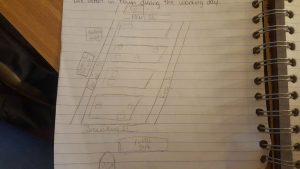
Physical Setting
The area that we explored would be considered bustling for the area. We were somewhat surprised that even at 9am a lot of tourists were out exploring the shops around town. A lot of the shops sold ice cream and coffee along with many different souvenir items. The buildings themselves looked like they had been there for a while, but had been updated on the insides especially. Despite the area being a little larger than we had expected, we realized how secluded the town is when we saw a sign that pointed to the closest Wal-Mart, which is 83 miles away from town.
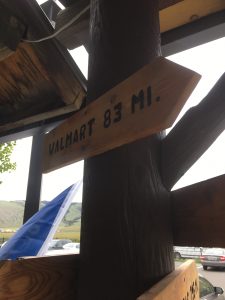
Interaction
While exploring the main drag of shops along the other side of the river, we decided to go in to a local saddle shop, called Kellem’s. There we talked to the owner, whose husband happened to be the owner of Absaroka Lodge where we’re staying here. She was very friendly and eagerly asked us where we were from, after which we asked her where she was originally from. She told us that she was from Brazil and had come to the U.S. originally as an interpreter with a group. While in Gardiner, she met the owner of the Absaroka Lodge, they fell in love and were married a year later, which quite frankly was adorable. She said she has enjoyed living in Montana for roughly the past 20 years, although she said she didn’t really appreciate the winters. After leaving her store, we browsed through a few more shops before entering the Wagon Wheel Trading post. While we were there, the owner Dianna, told us about how her and her husband had moved to Gardiner 17 years earlier to start a church. She was very open with us and kept telling us about how Gardiner had a small town kind of feel and was extremely welcoming. She went on to tell us about how her and her husband were only going to keep the store open for another season, before they sold everything and traveled around the country in their RV full time because her husband was in congestive heart failure.
May
30
Cooke City
May 30, 2017 | Comments Off on Cooke City
Our pack explored Cooke City on Saturday, May 27th at approximately 1pm. Cooke City is a small town in the mountains that is made up of one major road. The section of town that our pack explored was along the main road.
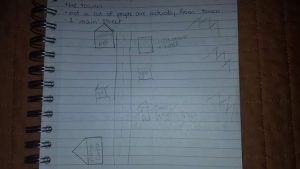
Physical Setting:
The town is completely centralized around the main road that runs through the town. Hotels, cabins, souvenir stores, and restaurants can be seen on either side of the road. The huge number of lodging choices along with restaurants helped to show our pack the influence that tourists and visitors have on the town. The souvenir stores also had very large storefronts in comparison to some of the other businesses in town, which emphasized the impact of tourists on town.
While walking through town, our group came upon the Cooke City General Store. This store is labeled very proudly as a registered historic building in town and is clearly very well loved. Despite the fact that the town obviously draws in a lot of tourists, the history of the town is proudly shown through the Cooke City General Store.
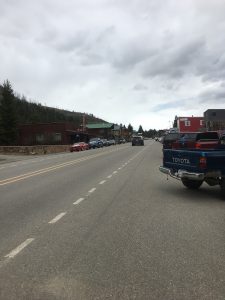
Interactions
While in town, we didn’t encounter many locals sadly. While in the Cooke City General Store, we stroke up a quick conversation with the man working behind the counter. We noticed that he had a thick accent so we decided to ask him where he was from. He simply said that he was from Minnesota and that he came to Cooke City because of the snowmobiling and was offered a job doing roadwork so he decided to stay. When we asked him if a lot of people came to Cooke City from other places, he said yes and that only 3 or 4 people stayed in Cooke City for life. After our encounter with the man in the general store, we didn’t encounter any other locals in the town other than those working in the souvenir shops trying to sell things to us.
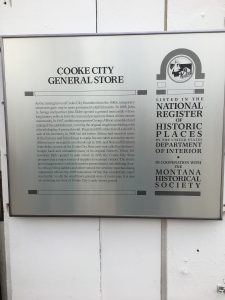
May
30
Place As Text: Livingston, Montana
May 30, 2017 | Comments Off on Place As Text: Livingston, Montana
Our visit to Livingston began at around noon in The Sacajawea Park. It was a dreary, overcast day and the temperature was in the low forties. Other than three or four children at a far away playground, we were the parks only visitors. We picnicked around a run down picnic table next to some decently well-kept tennis courts. We noticed that a lot of the playground equipment was outdated and fairly spread apart, like some pieces had been damaged and never replaced.
After a quick lunch, we hopped in our car and parked on a side street off the edge of the town, and began walking towards S. Main St. During a quick stroll around town, we noticed that bars, bakeries & restaurants and art galleries make up a good amount of businesses. This suggests that the town is a place of recreation and leisure for the people who enjoy it. We then walked into a clothing boutique called “High Trash”. The boutique was trendy and had a mid-century modern feel. There were clothes, shoes and accessories scattered throughout the store. We talked to the owner, her name was Bethany and she and her husband just opened the store on May 13th. They have two kids, a daughter who’s 3 and an infant son who was about 18 months. They were originally from Bozeman but moved to Livingston because the houses were bigger and cheaper. She liked that the town of Livingston is getting younger and they have a lot of art galleries, coffee shops, and clothing stores. We asked her why the name “White Trash” because we thought it was kind of bizarre, and she said “it is the clothing style that my friends and I would wear while out partying in college” so they brought the high class and white trash theme to the young girls in Livingston. In the back, the work of a local artist was featured, her name is Tori Olsen. They are hoping to have art shows and walks in the back of the shop during the summer.
After leaving “High Trash” we went to a thrift store called “Curated Closet”. The shop owner greeted us warmly, he appeared to be in his twenties and wore round plastic frames and a plaid shirt. The store contained an variety of clothes and accessories from various decades. After leaving both stores, we noted that there were only one or two customers in each. We then went to Livingston Center for Arts and Culture and we were greeted by a lady in the front of the and her dog, a sweet-tempered border collie she had rescued. After leaving the gallery, we met the rest of our group at a trendy bakery. Some of our group enjoyed coffee and pastries while we watched locals dart in and out.
May
28
Place as Text: Gardiner
May 28, 2017 | Comments Off on Place as Text: Gardiner
May 28th, 2017 at 7:17 pm
Hello All!
We are currently finishing our stay in Gardiner. After spending five days in Gardiner it was quite the experience for our pack. Throughout our visit we ventured to just about every corner of this small town. We stopped in many restaurants, shops, and checked out many of the tourist attractions. From checking these places out we came to realize that tourism is what keeps this town running.
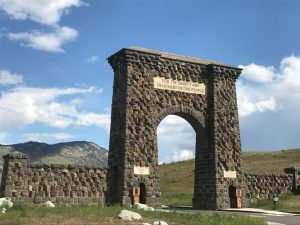 (The picture to the left is of the original entry way into Yellowstone which tourist still travel through today).
(The picture to the left is of the original entry way into Yellowstone which tourist still travel through today).
Just yesterday we visited The Everything Store, on Park Street, and talked to a very unique lady that owned the shop and has lived here for seventeen years. She told us that “tourism is the town,” and that any interruption to the constant flow of tourists has a huge impact on the Gardiner community. A few years ago Yellowstone decided to upgrade the entrance to Gardiner by paving it and planting some new trees and bushes, but the lady at the shop told us that when they closed the area to do the upgrades that the lack of business hit them hard and it still hasn’t caught back up, and won’t for a while. The last thing she said to us was that the park is a joke to many of the locals because they would stand up for the park, but if they were ever struggling then the park would not stand up for them. She wishes that the park would just do some simple things like adding trashcans to their upgraded area. It’s really ironic that the town feels that way about the park because the Roosevelt Arch at the entrance says, “For the benefit and enjoyment of the people.”
Gardiner is a gorgeous place from the views and the wildlife to the architecture and wild-west feel. The town is clearly set up to highlight the views and draw in 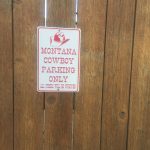 tourists. Gardiner also has shorter buildings just like Jackson so that you can enjoy the views from anywhere in town. The entrance to the town, which is the north entrance into the park is beautiful and shows off the entrance to Yellowstone with some beautiful architecture and the Roosevelt arch. This is such a cool way to come into the community and you get the western vibe they want you to feel. Another interesting thing about the architecture is that they are trying to modernize the town, which means construction and the beginning of big changes for Gardiner. On Main Street we noticed that the K Bar, a bar and pizza restaurant, has a very old-fashioned western, saloon style appearance but the building being built right next door has a more modern design. This is just the beginning of what could be an entirely new community in the not too distant future.
tourists. Gardiner also has shorter buildings just like Jackson so that you can enjoy the views from anywhere in town. The entrance to the town, which is the north entrance into the park is beautiful and shows off the entrance to Yellowstone with some beautiful architecture and the Roosevelt arch. This is such a cool way to come into the community and you get the western vibe they want you to feel. Another interesting thing about the architecture is that they are trying to modernize the town, which means construction and the beginning of big changes for Gardiner. On Main Street we noticed that the K Bar, a bar and pizza restaurant, has a very old-fashioned western, saloon style appearance but the building being built right next door has a more modern design. This is just the beginning of what could be an entirely new community in the not too distant future.
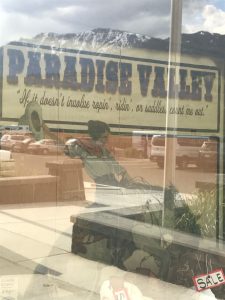 (This is a picture of a store front incentivizing tourist to come in because of a sale they are having. You can also see the mountains in the glare).
(This is a picture of a store front incentivizing tourist to come in because of a sale they are having. You can also see the mountains in the glare).
Not to our surprise, the prices here were high on everything just like Jackson. The only noticeable difference here is that alcohol was much cheaper than Jackson and even Farmville. One interesting thing we noticed was that there was no sales tax on everything we purchased. Our pack also spoke to a worker at the General pharmacy, a couple doors down from The Everything Store, who told us that sales tax doesn’t start until June 1st and ends September 1st, which is surprising because that is basically unheard of at home.
Just like everywhere else, one of our favorite parts of Gardiner is the wildlife. Gardiner is so much closer to the park than the other places we have visited, which brings a lot more wildlife into town. The coolest part is that at any time of the day we can walk out on the balcony of our hotel rooms and see one to three elk grazing right across the river in pretty much the same spot. Last night we even had to wait a minute to cross the parking lot because there were three mule deer hanging out right outside of our room! Its so crazy that the animals have no fear of us since they are so used to human interaction. Definitely not something we’re used to at home!
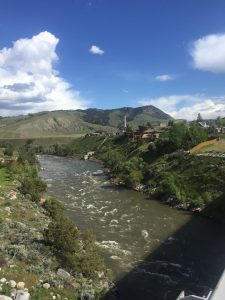 (This picture shows the landscape around Gardiner, and the hill behind our hotel which is normally filled with elk/white tailed deer).
(This picture shows the landscape around Gardiner, and the hill behind our hotel which is normally filled with elk/white tailed deer).
 (Map of the route we took in Gardiner, Montana)
(Map of the route we took in Gardiner, Montana)
May
28
Place as Text – Cooke City
May 28, 2017 | Comments Off on Place as Text – Cooke City
If we could say one thing to describe Cooke City it would be, “old-fashioned.” The town is set in between two mountains on the road that leads in and out of the Northeast entrance of Yellowstone National Park. This is the only road open during the winter so the population significantly decreases, going from about 350 people to 88. The town is pretty much confined to the sides of this road. Most people live either directly behind the stores, in very small houses, or in apartments above the stores they own.
When we fist arrived, we spent some time in the Visitor’s Center where we learned a little about the history of the town. In looking at the displays, we learned that it is a former mining town that has transformed itself to capitalize on the tourism brought by YNP. Also, in the Visitor’s Center, we saw public documents informing tourists about the proper distances to be kept between themselves and the wildlife. One document that stood out to us was a “selfie pledge” that encouraged tourists not to take selfies with the animals, which we later learned geared toward the Asian tourists.
Walking down the street, we observed that most of the buildings looked like they were stuck in time. Many of them were made of wood and had clear aesthetic damage. All of the hotels in the area were locally owned, not chains, which says that the locals are heavily invested in the tourist economy. Another thing we observed was that most of the business were restaurants or bars, which shows the impacts of tourism on the economy.
Our next stop was at a local convenient store where we spoke with the shop owner who had lived in Cooke City for his whole life. He said that growing up he had and hour and a half trip to school and during the winter the first eight miles was travelled by snow mobile. He also told us that there were only four children in the school right now. This just speaks to how difficult it can be to live in a small town. One of the things that we were most worried about was the fact that there was no cell phone service. He told us that they have never had service and at one point AT&T tried to put a tower in the middle of town, but the town voted it down. He said that everyone there has a landline and two years ago they got dial up internet. We noticed that when we were walking around there were signs for public phones and phone booths for tourists.
Finally, we finished our visit by walking through the shops lining the street. Many of them were very small and had few customers, but were very obviously geared toward tourists as the sold memorabilia related to the park. Additionally, most of the restaurants were built like bars to give the town an “old west feel” as one of the residents told us. I think all of the members of our pack can agree that living in Cooke City is definitely very different from anything we are used to and would take a big adjustment.
Here is a map of our day!
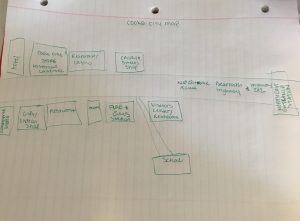
May
27
Place as Text: Cody
May 27, 2017 | Comments Off on Place as Text: Cody
May 27, 2017 at 7:30 pm
Hello All!
Today we got to explore a town called Cody, Wyoming. We began our small adventure when we were dropped off in a parking lot next to a famous Buffalo Bill’s Irma Hotel. As we walked down Sheridan Ave., we saw several shops that were promoting the wildlife which is there main attraction in Cody, Wyoming. We passed a store called True Indian which had a bunch of animal skulls, calf skins, 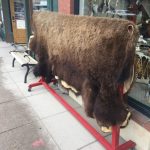 even a bear rug outside of the shop. As we walked a little further we saw a jewelry store known as The Golden Buffalo which promoted the buffalo as the signature of Wyoming. They had a poster in their front window with the buffalo diamond necklace with the word, keepsake. We found it interesting that the jewelry store was promoting the buffalo as the keepsake as they do not have much buffalo in Cody in comparison with Yellowstone National Park.
even a bear rug outside of the shop. As we walked a little further we saw a jewelry store known as The Golden Buffalo which promoted the buffalo as the signature of Wyoming. They had a poster in their front window with the buffalo diamond necklace with the word, keepsake. We found it interesting that the jewelry store was promoting the buffalo as the keepsake as they do not have much buffalo in Cody in comparison with Yellowstone National Park.
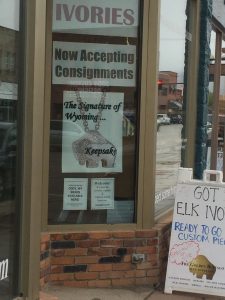 (The picture to the left is of the the signature of Wyoming, aka the bison).
(The picture to the left is of the the signature of Wyoming, aka the bison).
Another aspect of Cody we noticed as we were walking down the road was that the buildings were taller than in Jackson, Wyoming, and the downtown was not as symmetrical in architecture. By this I mean, buildings were different heights, and different designs where as in Jackson the buildings downtown were all the same height and all the same color and design for the most part. The landscape was fairly flat around the town, with mountains in sight every direction we looked. The town itself was not directly a valley, however, parts of the town were located in the flood plain and a valley. In Cody there are many ranchers that use the flat plains for their livestock to graze, however, we learned many locals are okay with the grizzlies being around the town, which are quite common in Cody, and strongly dislike the wolves.
As we walked down the main street (Sheridan Ave) we went into the local bookstore where we talked to an employee who moved to Cody six years ago. Laure, the employee, basically said that the locals believe in cohabiting with the wildlife and want to see the wildlife on their landscape. They do not want the animals to be afraid to come to their town, and as long as locals are smart about their surroundings then there is much less risk of attacks. Lauren believes that tourism is the town of Cody. Without tourism many local businesses would not be in town. She also touched briefly how as of the last few years tourism has been increasing dramatically in Yellowstone which increases the tourism in the surrounding towns as they need places to stay. She said locals for the most part appreciate their present as long as there is respect for them, and the town. We saw outside of her show a sign that show’s her support for Yellowstone National Park which in turns creates more business in the town of Cody because more and more tourists are coming.
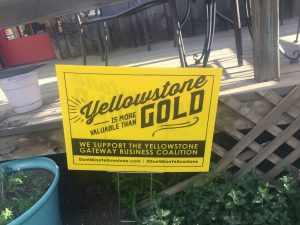 (The picture to the left is showing the town’s support for Yellowstone National Park which in turns benefits them due to tourism increasing).
(The picture to the left is showing the town’s support for Yellowstone National Park which in turns benefits them due to tourism increasing).
We walked a bit further where we went into a high-end furniture shop. It was interesting as we walked around and saw the kinds furniture they were displaying. The furniture store was promoting the Wild West type of vibe, with wood bed frames, animal heads on walls, and animal printed chairs. We then had the opportunity to talk to the owner of the store who gave us quite the opposite opinion on not only the town, but on wolves from what we previously heard from others while on this trip. This was interesting to us because most people don’t like to give us their opinions on such conflicting issues like the wolves without knowing who we are really. However, she explained to us that the wolves kill to just kill. Her and her husband do participate in the managed hunts every season because she does not believe the wolves in Yellowstone that were reintroduced from Canada should not be allowed in Yellowstone. Although her and her husband do hunt the wolves, they don’t believe in hunting all predators. They have a family of foxes that live in their back yard and they have even given them names! She has horses, and last summer one of her mares gave birth to a colt, and the wolves came and killed the colt because they smelled the fresh placenta from the birthing process, so now when they have babies they have to get rid of all the blood/placenta immediately to avoid that situation taking place again.
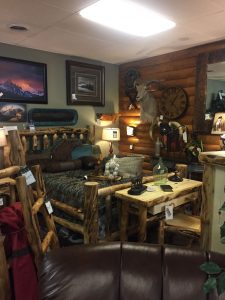 (The picture to the left is of the high end furniture store we visited, and it shows the the kinds of furniture people in Cody use to decorate their homes/the look they want in their homes).
(The picture to the left is of the high end furniture store we visited, and it shows the the kinds of furniture people in Cody use to decorate their homes/the look they want in their homes).
All in all, the individuals we talked to while in Cody wanted to educate us, and help us understand their view points even if we don’t agree. They were not trying to argue, but rather explain the facts that they knew. Managing wildlife is something that will never have one resolution because not everyone will be pleased with the final answer. Cody was a larger town than Gardiner, and was bout three hours away from Gardiner. However, I am glad we had the opportunity to go and learn new perspectives, and see the differences in landscape.
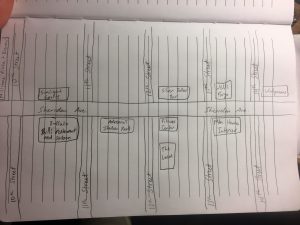 (This is a map of the route we took while in Cody).
(This is a map of the route we took while in Cody).
May
27
Place as Text- Livingston
May 27, 2017 | Comments Off on Place as Text- Livingston
On May 25th, 2017 at 12:30pm, we walked around the town of Livingston, Montana. Our first impression of Livingston was that it was a similar size to Gardiner. However, we overheard people talking on the street about the overpopulation in Livingston so we looked up how much bigger it is. Gardiner has a population of 875 people, while Livingston has a population of 7,044 people. This was very surprising to us because Livingston did not feel much bigger than Gardiner. The town had an old-timey feel because of the state of the buildings and some of the structures in town. We also noticed that the shops throughout town all had art that revolved around trout. We really liked the art because our group is studying trout, but we didn’t understand why it was all over. Our guess is that Livingston is a big fishing town, but we didn’t have a chance to ask anyone.
Our group had our oral history interview in Livingston, so we did not have more than 20 minutes to explore the town unfortunately. However, we did our interview with Orville Bach who has been a season ranger for 43 years. Before the interview, we told him that our issue was about the lake trout and cutthroat trout issue and he was very interested in what we had learned already. During the interview, he then told us that the introduction of the lake trout was one of the worst things he had seen happen to the park in his time as a ranger. He strongly supports the repopulation of cutthroat trout, which was fascinating because he has worked in the park for so long and his view is still in line with all of the younger people we have talked to while on this trip.
Livingston was definitely a very interesting little town and we learned a lot during our short stay there. Whether it was just roaming the streets of Livingston while we had a little bit of spare time, or having our interview with Orville, there was definitely a lot learned. However, we wish that we would have had more time to explore the town and hope that sometime in the future we will be able to go back and visit Livingston. Our interview with Orville definitely helps us out with our stewardship and other insights into the park.
To view pictures of our short journey through Livingston, click the link below!
https://docs.google.com/document/d/1kzkwqtrkvPh8u-Mu-4ncBf2L2mBM13rZR_90OexnRfs/edit?usp=sharing
#LakeTroutOut
May
27
Place as Text- Gardiner
May 27, 2017 | Comments Off on Place as Text- Gardiner
Hello World!
On May 25th, 2017 at 8:30am we explored the small town of Gardiner, Montana. The area that we explored was the road our hotel is off of (S 2nd St.) and to the left on E Park St. towards the Yellowstone River. In this area there was a fish shop, a gift shop, restaurants, a factory, and residential homes. We noticed that at this time of the morning many of the stores and restaurants were not open yet. We had to walk around outside until 9:00am for things to open up. We also noticed that not many locals were out in Gardiner that early in the morning. We all noticed that there were lots of tourists out and were very curious about it. Once the stores opened we realized that the locals were all the people who had been preparing the stores for the tourists.
We first went to Parks Fly Shop to talk to the two men who worked there, Wally and Ben. We told them about our stewardship question regarding the repopulation of cutthroat trout. They told us that generally, people were in favor of the repopulation of the cutthroat trout in the Yellowstone River. We asked them about the removal policies of the lake trout and they told us about the catch kill policy at Yellowstone Lake. None of us knew what this was and they explained that if you catch a lake trout from Yellowstone Lake, you are required to kill it or keep it, instead of throwing it back in the lake. Wally then brought up the fact that lake trout are only an issue in Yellowstone Lake and are actually welcomed in other areas.
After we finished talking with Ben and Wally we went to Yellowstone Gifts and Sweets and spoke to one of their employees, Alex. She is from Bulgaria and told us that she came to Gardiner through a work program. She likes it a lot here and says that it is a very different environment for her because she is from the capital of Bulgaria. We asked her what the biggest issues were in the park that she knew of and she told us she only knew a little bit about the issues with the wildlife in the park. She didn’t know much because she has only been hiking a couple of times since she moved to Gardiner. She was very interested in our program and asked us a lot about it. After talking to her, we looked around the shop for a bit. She was very helpful while we were browsing.
We really enjoyed our exploration of Gardiner, especially the place we found at the end. We found a small pavilion on the edge of the hill where you had an amazing view of the scenery. Having a chance to see the amazing view that that the locals in Gardiner have every day was the perfect way to end our exploration of Gardiner.
To view pictures of our journey through Gardiner, click on the link below!!
https://docs.google.com/document/d/11Dzfw_dAN_JlxD8STQ2_GvnmC2IN2EKy9F6b96evECQ/edit?usp=sharing
#LakeTroutOut
May
27
Place as Text Gardiner
May 27, 2017 | Comments Off on Place as Text Gardiner
Today, we explored Gardiner, which is where we have been staying the past couple of days. Gardiner is beautiful, with a beautiful mountain view. Our initial impression of the town was that the theme was very authentic and not forced like Jackson. The scenery is gorgeous, right behind our hotel we see the Yellowstone river and the snowcapped mountains in the background. Here is a picture of a map of the main road in town.
Today we went white water rafting and spoke lots with our guide Libby, she was your typical nature girl that you’d expect to be leading an adventure like this. She shared lots of cool information about the local spots and intriging myths about the rock formations in the mountains. After rafting she recommended we walk over to the famous elk burger place next door to try their elk burger. We tried the burger and thought it tasted great. While we were sitting outside eating, the biannual “Hell’s Aroarin’ Horse Drive” was happening. We went to the sidewalk and had front row seats to watch all the horses run through town along with all the other tourists and town members. This was exciting and a highlight of our trip.
As we were walking through town we noticed the modest looking buildings. The modesty of the buildings matched the simplicity of the people we encountered. We found a couple help wanted signs on the buisnesses and several of the bar-like restaurants were advertising their specials outside daily.
We have enjoyed Gardiner and hope to do some more exploring and meet some more people since we have some free time this evening. #TheGrizzLU